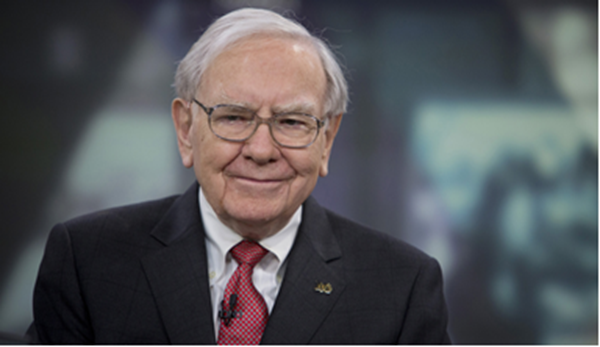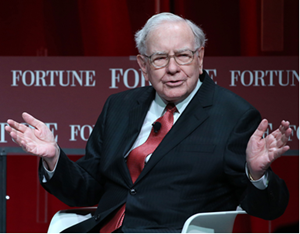|

Buffett Says Skip Paying
Wall Street for Advice on Activists
by
Noah Buhayar and
Sonali Basak
October 13, 2015 — 12:08 PM EDT
Updated on October 13, 2015
— 1:43 PM EDT
|

■
Warren Buffett, chairman
and chief executive officer of Berkshire Hathaway.
Photographer: Scott Eells/Bloomberg |
► Berkshire CEO:
It's better to deliver results, communicate
► He says
activists are now targeting well-run companies
Warren Buffett, the billionaire chief executive officer
of Berkshire Hathaway Inc., said corporate executives who are seeking
to fend off activist investors should return to the basics and
consider skipping strategies pitched by Wall Street.
“The best way to keep activists away is to perform
reasonably well in your business and also to communicate well with
your shareholders,” Buffett said Tuesday at Fortune’s Most Powerful
Women Summit in Washington. “You’ve got a bunch of owners out there
and, on balance, they’re going to be on your side. After all, they’ve
got their money with you.”
|

■
Warren Buffett
Photographer: Mark Wilson/Getty Images
|
|
The rising influence of money managers who amass stakes
in companies and push for changes has spurred an industry of bankers
and lawyers peddling expensive advice to companies, Buffett said.
Goldman Sachs Group Inc. and Morgan Stanley, the No. 1 and 2 takeover
advisers this year, are among firms that have been
hiring
in their activism-defense groups.
“It’s in Wall Street’s interest to scare managements
about activists,” Buffett said. “They’re not dying to have an activist
knock on your door, but it doesn’t cause them to break out in tears
either, because you take them on and they get all involved in your
strategy. And it’s their job, to some extent, to make you worry even
more than you probably should.”
‘Like Sharks’
Buffett, 85, has long been a critic of Wall Street
excesses, panning bankers and their outsize pay in his annual letters
to shareholders. He and Berkshire Vice Chairman Charles Munger have
become increasingly outspoken in recent years about the popularity of
activist investing, too, saying the money managers who pursue the
strategy are often looking for short-term gains.
The trend has gotten so much momentum that now even
decently run companies are being targeted, Buffett said Tuesday,
without citing examples.
“They’re like sharks: they’ve got to keep swimming,”
Buffett said of activists, adding that some are paid fees tied to how
much money they manage. “They stretch for targets, and you’re seeing
that. But there is a place for them in America. All American
businesses are not being run in the interest of their shareholders
with really capable management. When that happens, change is needed.”
Two of the biggest practitioners of activism -- Bill
Ackman and Carl Icahn -- have
disputed
Buffett and Munger’s characterization of the approach, saying that
they’re invested for the long-haul. They’ve argued that their efforts
have led to improvements at companies including General Growth
Properties Inc. and Apple Inc.
‘Fun to Joust’
Just last week, Icahn got his way at Freeport-McMoRan
Inc., the world’s largest copper producer, which announced it was
naming two of his
associates
to its board. The billionaire has also staged campaigns at companies
including Hertz Global Holdings Inc., Gannett Co., Family Dollar
Stores Inc. and EBay Inc. since the beginning of 2014.
DuPont Co. has been battling a separate campaign. CEO
Ellen Kullman abruptly
resigned
this month after narrowly winning a proxy fight in May against Nelson
Peltz. The investor has pushed to break up the company.
Buffett joked that if executives get desperate in such
situations, they should send the agitators to Berkshire, which is well
positioned to resist pressure from activists. The billionaire is the
largest shareholder there and his friends also hold major stakes.
“It’s just fun to joust with them,” he said. “They’re
not going to get anyplace, so maybe we can be sort of a rest home for
activists.”
‘Life of Misery’
Buffett built Berkshire into a sprawling conglomerate
over the past five decades, largely by buying businesses and leaving
management in place. The Omaha, Nebraska-based company now has more
than 80 subsidiaries, ranging from auto insurer Geico to railroad BNSF.
He said he has no intention of joining the activists’
ranks.
Munger “told me 20 years ago, if you want to guarantee
yourself a life of misery, marry someone with the idea of changing
them,” Buffett said, adding that his preferred approach in investing
is to back companies where he can “join in the spirit of the whole
organization.”
For people who go into relationships seeking change,
“You’ll be miserable the rest of your life,” Buffett said. “I’m just
not looking for that kind of trouble.”
©
Bloomberg L.P. |

